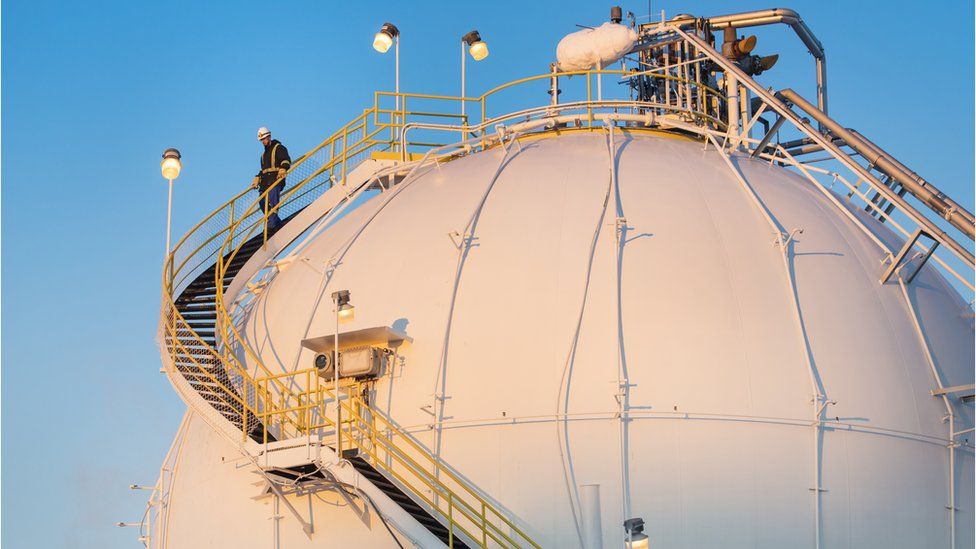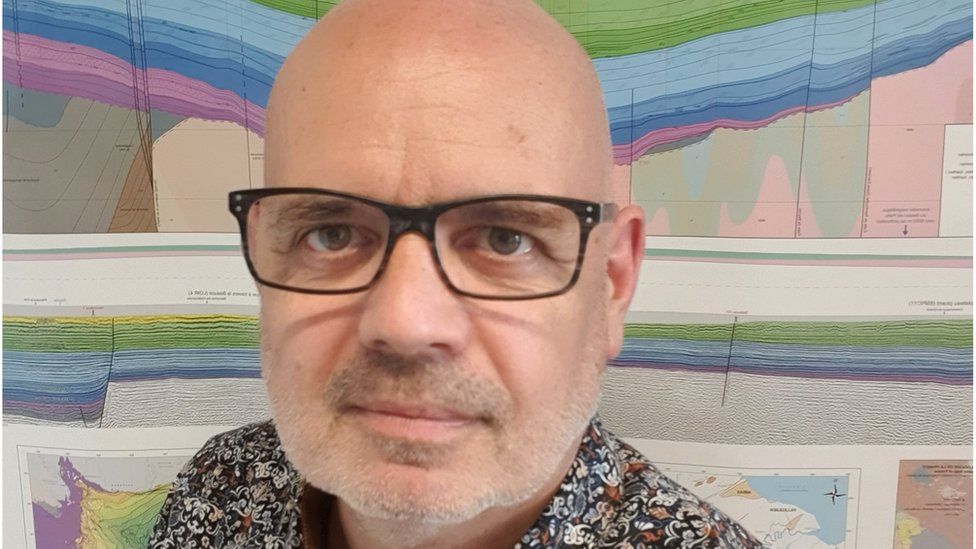Earlier this year Professor Jacques Pironon was searching for methane in the Lorraine Basin, northeast France, when his team made an unexpected discovery.
Around 3,000m underground they found a very large deposit of hydrogen.
“It is what we call serendipity,” says Prof Pironon, research director at France’s Centre National de la Recherche Scientifique (CNRS) at the University of Lorraine.
Not long ago such a find would have been of academic interest only, but these days it creates a stir.
That’s because many think hydrogen will be an essential fuel in years to come. They argue it could be the key to moving the global economy to net zero, as hydrogen does not produce CO2 when used as a fuel or in industrial processes.

But the big drawback with hydrogen is that, at the moment, most ways of producing are not green at all.
According to the Carbon Trust, less than 1% of current global hydrogen production is emission-free.
There is grey hydrogen – produced by splitting methane into carbon dioxide and hydrogen (H2). Blue hydrogen is produced the same way, but the CO2 produced is captured and stored.
Black hydrogen is produced by partially burning coal.
Green hydrogen, that elusive 1%, is created through the electrolysis of water into oxygen and hydrogen.
But green hydrogen is relatively expensive and in short supply, so any other emission-free supply of the gas would be welcome.
Known as natural hydrogen, gold hydrogen or white hydrogen, natural deposits could be an important source.
They are produced in a number of ways but the main process involves the interaction of ground water with iron-rich minerals such as olivine. This causes the water to be split into oxygen, which binds with the iron, and hydrogen.
The French discovery is not the first time that naturally-occurring hydrogen has been found – there’s already a small well in Bourakébougou, western Mali, and there are also believed to be large deposits in the US, Australia, Russia and a number of European countries.

However, the discovery in France is believed to represent the largest naturally-occurring deposit of the gas ever found. Prof Pironon estimates there could be 250 million tonnes of hydrogen, enough to meet current global demand for more than two years.
There could be many more hydrogen deposits lying undiscovered around the world – the US Geological Survey (USGS), estimates thousands or perhaps billions of megatonnes.
Not all this will be readily exploitable, cautions USGS research geologist Geoffrey Ellis, who has modelled the amount of geological hydrogen.
“This is the global model, and the vast majority is going to be inaccessible – too deep or too far offshore, or in accumulations that are much too small for it to ever become economical to actually access,” he says.
But the USGS estimates that there is probably around 100,000 megatonnes of accessible hydrogen – and that could represent hundreds of years of supply.
The techniques for harvesting it, says Mr Ellis, “should be similar to natural gas. The technology is already in place.”
While the Bourakébougou site in Mali is currently the only facility producing white hydrogen commercially – and is only harvesting around five tonnes per year – there are moves to exploit reserves more widely.
Earlier this year, Bill Gates’s Breakthrough Energy Ventures investment firm put $91m (£72m) into US start-up Koloma, which is looking to exploit white hydrogen reserves in the US.
Meanwhile, prospecting firm Getech is hunting out potential deposits in Morocco, Mozambique, South Africa and Togo.
One major area of focus is South Australia, which in 2021 added hydrogen to the list of regulated substances permitted for exploration under the Petroleum and Geothermal Act 2000, clearing the path for exploration.
“Since February of 2021, six different companies have applied for and been granted 18 exploration licenses for gold hydrogen,” says Suren Thurairajah, partner, climate and sustainability, at Deloitte Australia.
“The area under permit is 570,000 square kilometres, which is 32% of the size of the state of South Australia.”
Most recently, a company called Gold Hydrogen announced the discovery of a large field of natural hydrogen in the state, which it hopes to bring into production next year or the year after.
So far, the major energy players are holding back.
“The big oil companies, I think, are very interested, but they’re currently sitting on the sidelines, watching, taking a bit of a wait-and-see attitude. They’re letting the start-ups take the risk – at this point this is a highly risky venture,” says Mr Ellis.
“Once we see some production data from some of these wells, we will certainly see the major oil and gas companies moving into this space.”
One problem, he says, is that there’s currently a lack of market for hydrogen in the US, reducing the incentive for exploration.
According to industry group the Hydrogen Council, Europe is the global leader in hydrogen project proposals, accounting for 35% of global investments, with Latin America and North America each representing about 15% of investments.
“So there’s a sort of chicken and egg problem: markets aren’t really developing until they see the supply, and the supply won’t really be developed until they see the market,” says Mr Ellis.
But, he adds: “I think it’s a function of how much effort we put in. If we really decide this is something we need to figure out quickly, I think it could be done.”










13 comments
I think this is one of the most vital info for me. And i’m glad reading your article. But wanna remark on few general things, The site style is wonderful, the articles is really great : D. Good job, cheers
naturally like your web site but you need to test the spelling on several of your posts. Several of them are rife with spelling problems and I find it very bothersome to tell the reality nevertheless I?¦ll definitely come back again.
I¦ll right away grasp your rss feed as I can not to find your e-mail subscription link or e-newsletter service. Do you’ve any? Kindly let me recognize in order that I may subscribe. Thanks.
obviously like your website but you need to take a look at the spelling on quite a few of your posts. A number of them are rife with spelling problems and I in finding it very troublesome to tell the reality then again I¦ll definitely come back again.
Hey there! This is kind of off topic but I need some help from an established blog. Is it hard to set up your own blog? I’m not very techincal but I can figure things out pretty fast. I’m thinking about making my own but I’m not sure where to begin. Do you have any ideas or suggestions? With thanks
Hello there! Do you know if they make any plugins to help with SEO? I’m trying to get my blog to rank for some targeted keywords but I’m not seeing very good results. If you know of any please share. Thank you!
I think this web site has some rattling wonderful info for everyone : D.
I got what you mean , appreciate it for posting.Woh I am lucky to find this website through google.
Some really wonderful work on behalf of the owner of this internet site, dead great subject material.
What is CogniCare Pro? CogniCare Pro is 100 natural and safe to take a cognitive support supplement that helps boost your memory power. This supplement works greatly for anyone of any age and without side effects
You made some decent points there. I looked on the internet for the subject and found most individuals will agree with your site.
Greetings! I know this is somewhat off topic but I was wondering if you knew where I could locate a captcha plugin for my comment form? I’m using the same blog platform as yours and I’m having problems finding one? Thanks a lot!
An impressive share, I just given this onto a colleague who was doing a little analysis on this. And he in fact bought me breakfast because I found it for him.. smile. So let me reword that: Thnx for the treat! But yeah Thnkx for spending the time to discuss this, I feel strongly about it and love reading more on this topic. If possible, as you become expertise, would you mind updating your blog with more details? It is highly helpful for me. Big thumb up for this blog post!